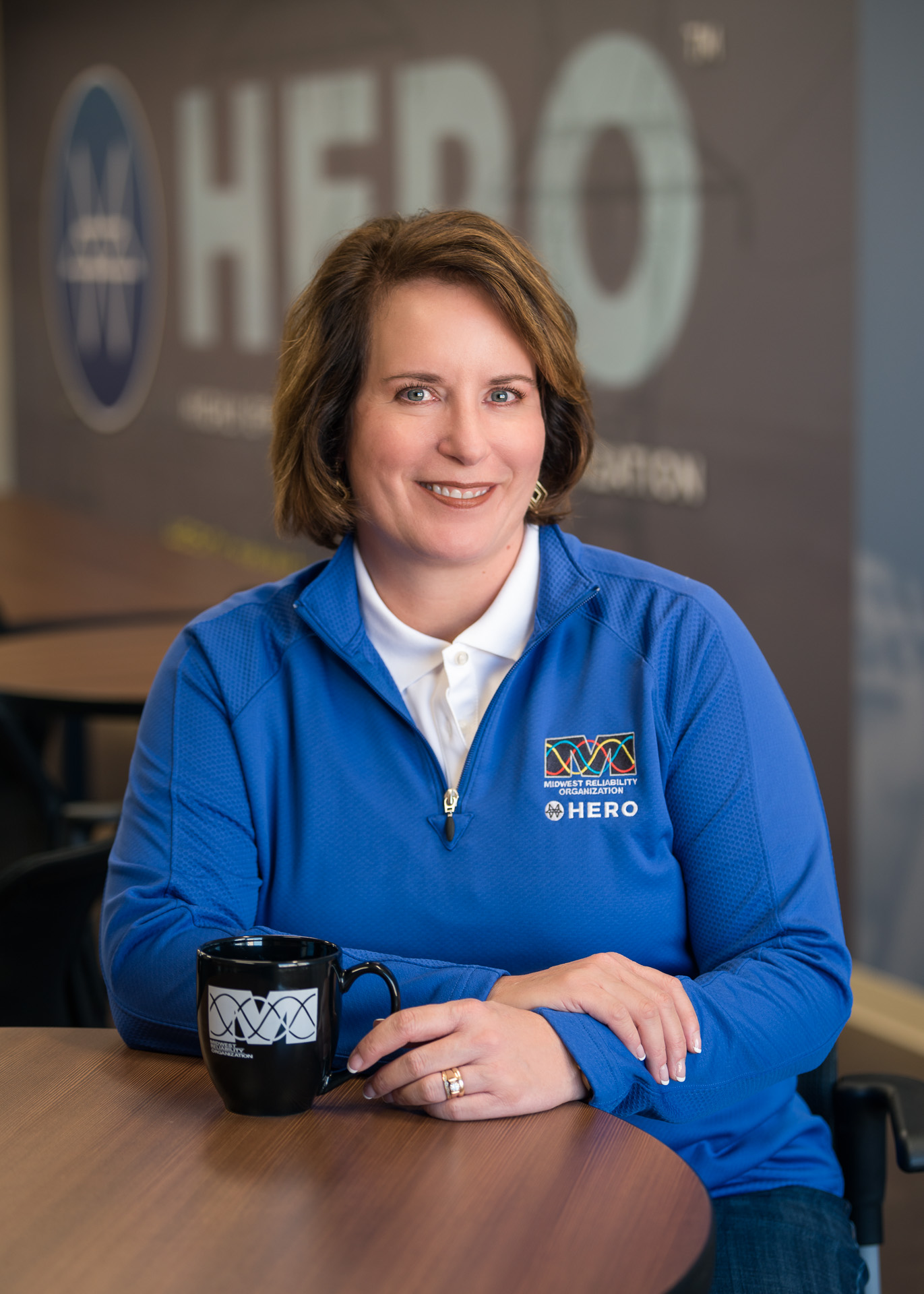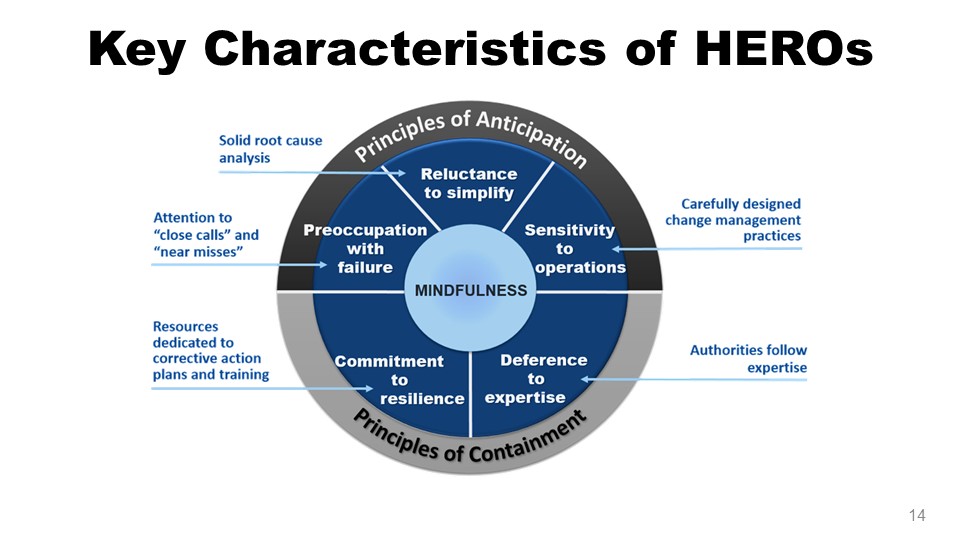
For more than a decade now, MRO has promoted High Reliability Organization (HRO) theory and principles as a framework for ensuring reliable operations in the increasingly complex and interconnected operating environment that encompasses the North American bulk power system. We want all registered entities we interact with to be Highly Effective Reliability Organizations® or “HEROs.” Implementing high standards of operational excellence supports the mission that we share across the ERO Enterprise to identify, prioritize and assure effective and efficient mitigation of risks to there liability and security of the North American bulk power system. But, you may be asking, what does that mean for my organization? What exactly does it mean to be a HERO?
There is rich literature in organizational theory on HROs which originated in studies of aircraft carriers, firefighters, nuclear power operations, and other contexts where unexpected events may have life and death consequences. One of the hallmarks of HROs is that they have strong responses to weak signals. Author Daniel Goleman illustrates this point in his book Focus: The Hidden Driver of Excellence. Goleman tells the story of Nobel prizewinning astronomers Arno Penzias and Robert Wilson. Overwhelmed with data being gathered from powerful new equipment, they initially ignored some static assuming it was the result of faulty equipment and unimportant. After a chance encounter with a nuclear physicist, they realized the static was actually the weak signal from the reverberations of the big bang. This notion of the importance of weak signals is one of the main ideas that Karl Weick and Kathleen Sutcliffe have articulated in their research on HROs and in their book, Managing the Unexpected.
An HRO is an organization that has succeeded in avoiding catastrophes in an environment where operational challenges can be expected due to risk factors and complexity. According to Weick and Sutcliffe, HROs manage the unexpected through five principles: (1) preoccupation with failures rather than successes, (2) reluctance to simplify interpretation, (3) sensitivity to operations, (4) commitment to resilience, and (5) deference to expertise, as exhibited by the encouragement of a fluid decision-making system.

Organizations that follow these five principles produce a collective state of mindfulness. To be mindful is to have a rich awareness and a discriminatory sense of detail, which enhances the ability to discover and correct errors before the errors compound and escalate into a crisis. These five principles are fundamental and are the basis of improvements in quality, reliability, productivity, and resiliency in any organization. By developing mindfulness, HROs demonstrate the capacity to anticipate and to contain unexpected problems.
MRO considers HEROs to be those entities that demonstrate effectiveness at identifying risks, assessing those risks, and mitigating risks using the following five HRO principles.
1. Preoccupation with Failure
To be preoccupied with failures rather than successes means that HROs encourage reporting errors, they sweat the small stuff, and they use a robust feedback system. They treat even small mistakes and misoperations as potential symptoms that something is wrong with the system, something that could have severe consequences if several separate small errors coincide. They also make a continuing effort to articulate mistakes they don’t want to make; they have a preoccupation with failure.
2. Reluctance to Simplify Interpretation
To be reluctant to simplify interpretation means that HROs take deliberate steps to create a complete picture. They encourage varied experiences and differences of opinion without destroying nuances that diverse people detect. HROs understand that a simple answer to a complex problem may indicate a less than full understanding of the problem. When they “recognize” an event as something they have experienced before and understood, that recognition is a source of concern rather than comfort. The concern is that superficial similarities between the present and the past mask deeper differences that could prove significant.
3. Sensitivity to Operations
To be sensitive to operations means that HROs want to know how things work, not just how they are supposed to work. They treat deficiencies in normal operations as “free lessons” that signal the development of unexpected events. HROs are attentive to the front line where the real work gets done. People who refuse to speak up out of fear undermine the system, resulting in less knowledge than is needed for the system to work effectively. It makes no difference why the information is withheld—whether it is for reasons such as fear, ignorance, or indifference—the result is the same.
4. Commitment to Resilience
A commitment to resilience means that HROs develop capabilities to detect, contain, and recover from those inevitable errors that are part of an indeterminate world. HROs develop behaviors that allow individuals and their organizations to be resilient. HROs approach unplanned events in terms of mitigation and rapid recovery. The hallmark of an HRO is not that it is error-free, but that errors don’t disable it. Resilience is a combination of keeping errors small and of improvising workarounds that allow the system to keep functioning. Both these pathways to resilience demand deep knowledge of the technology, the system, one’s coworkers, and most of all, oneself.
5. Deference to Expertise
HROs make decisions based on the technical truth and rely on the people with the most expertise. They understand that decisions that defer to technical expertise are likely to be more timely and correct. Decisions made on the front line migrate to the people with the most expertise, regardless of their rank.
MRO’s HEROs exemplify a collective state of mindfulness. This mindfulness allows for continually tracking small failures, resisting oversimplification, remaining sensitive to operations, maintaining capabilities for resilience, and taking advantage of shifting locations of expertise. Applying HRO principles to the important work we each do to protect the reliability and security of the North American bulk power system is more important now than ever before.
Thank you for being an MRO HERO.
Our future is bright!
– Sara Patrick, President and CEO